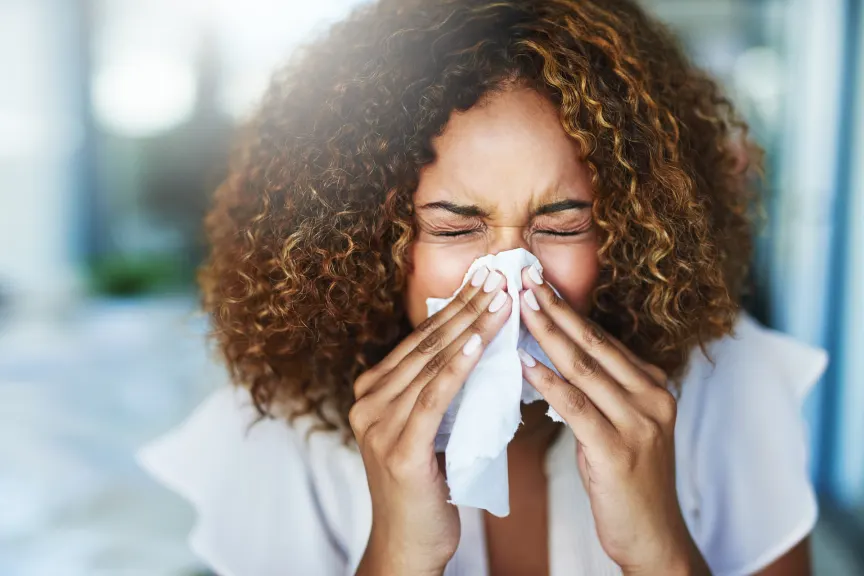Your Top Flu Questions, Answered by Doctors
This flu season looks different than last year (with COVID-19 tagging along). Here’s how to prepare.

Flu season isupon us again. Only this time, with the COVID-19 pandemic looming over our heads, the thought of fighting off two sicknesses can take anxiety levels from a solid nine to a 15.5 (on a 1-10 scale!). With all that stress come the questions… What might be different now than in years past? Is there any way to prepare for the months ahead? Do I really needtwoflu shots?
Knowledge is power, and we’re here to help you rest easier. We spoke with two infectious disease experts to answer your biggest flu shot questions, from immunity to side effects to COVID-19 comparisons.
When is the best time of year to get the flu shot?
In a recent Instagram interview with actress Jennifer Garner, Anthony Fauci, M.D., director of the National Institute of Allergy and Infectious Diseases, explained that it’s best to get the flu shot in October. This way, he told Garner, your immunity won’t wear off by spring. But what about the flu shots being offered in local drugstores as early as August? Is that too early to get vaccinated?
“This is a controversial topic among physicians in the infectious disease community,” says Natasha Mubeen Chida, M.D., an infectious disease physician at Johns Hopkins Hospital in Baltimore. “Some people recommend waiting until October to get the flu shot, whereas others say, if it’s hard for you to get to the doctor or to get the shot, it’s important to get it when you can.” So if you’re able to plan it out and get your shot in October, go for it. But if you’re already headed to the doctor in September and can get the shot then, that’s fine, too. “Just make sure you get it,” Dr. Chida says. “That’s the most important thing.” As for a cut-off date, the CDC recommends getting the shot before the end of October, so don’t wait longer than that.
Is there anyone who shouldnotget a flu shot?
In short, no. “There’s a lot of misinformation out there about that,” says infectious disease specialist James Cherry, M.D., a research professor at the David Geffen School of Medicine at the University of California, Los Angeles.
The CDC recommends the shot for everyone over six months old, with one exception: someone with a life-threatening allergy to any ingredient in the vaccine, such as gelatin or antibiotics. “If somebody has a history of a neurologic reaction following a flu vaccine, they probably shouldn’t get the flu shot, but that’s extremely rare,” Dr. Cherry says. Talk to your physician if you are concerned and want more details.
Do any medications interact with the flu shot?
Again, nope! The flu shot is safe for people on all different types of medications. People on immunosuppressants may not form as strong an immune response to the virus, meaning they could be less protected from the flu than others who get the shot. “But that doesn’t mean they shouldn’t get it,” Dr. Chida urges. “They should be even more vigilant about making sure they’re not around people who are sick and that anyone they’re in close contact with also gets their flu shot.”
Does the flu shot have any side effects?
You may have heard friends complain about feeling fatigued or sore after getting their flu shot. Dr. Chida explains that this is normal and means the shot is doing its job. “It’s a shot that’s meant to make your immune response wake up and build up some immunity,” she says. If you feel a bit achy, that’s a good sign that your body is responding appropriately (although many people never get side effects, and that’s fine, too). “The most common side effect is soreness at the injection site,” she notes.
如果你碰巧你之后患了重病flu vaccine, don't panic. It’s likely due to another virus that hit at a coincidental time. “Most often, when people get the flu shot and then get sick, they happened to pick up some other respiratory virus at the same time as they got the flu shot,” says Dr. Chida. “In their mind, they’re linking the two.” You shouldn’t experience any side effects from your shot other than mild, short-term discomfort. If you're worried about more serious symptoms, check with your doc to be sure everything is OK.
Is the flu expected to be different this year, in light of the COVID-19 pandemic?
Preliminary World Health Organization data from the Southern Hemisphere (which has been going through winter these last few months) suggests that the flu might be milder than usual this year. Both Dr. Chida and Dr. Cherry confirm this, but that doesn't change the fact we're facing two viruses instead of one. COVID-19 is still very new, and lots of information is yet unknown.
Do masks and social distancing help prevent the flu?
Great news! Your pandemic protocol is doing double-duty. “Social distancingand masks work with coronavirus and the flu,” Dr. Cherry says. “We know that from over 100 years ago, with the 1918 flu,” another form of the influenza virus that took its toll on Americans. You may recall seeing old photos from that pandemic of people wearing masks out and about (talk about déjà vu).
Dr. Chida explains that both the flu and COVID-19 spread through respiratory droplets. “The flu is a respiratory virus, like SARS-COV-2,” she says. “The same measures that help prevent you from getting COVID should help prevent you from getting flu as well.”
Can you get the flu and COVID-19 at the same time?
“Sure, it’s possible that you could get both viruses at the same time,” Dr. Cherry says. This can happen with other respiratory viruses such as influenza and respiratory syncytial virus (RSV). Again, though, it’s impossible to predict how common this will be. “We’ll really have to wait and see,” he says. To avoid ending up in that situation, get your flu shot and keep up your commitment to social distancing.
How can you tell the difference between flu and COVID-19?
We know both viruses are spread through similar mechanisms. If you get sick, how will you know which one you might have? “Both can present in identical ways,” Dr. Chida says. Fever, chills, cough, and shortness of breath are the most common symptoms. She explains that loss of taste and smell is a symptom unique to COVID, though not everyone with the virus develops this. And the CDC notes that COVID symptoms usually take five days after infection to develop, versus one to four days for the flu. Dr. Cherry adds that pneumonia is an early COVID sign that isn’t as common in flu patients until later in their disease progression.
For the sake of your health, it’s best toget tested for COVIDif you start feeling sick. “If you’re having fever, chills, sore throat, or cough, it could be either [COVID or flu],” Dr. Chida notes. “You need to talk to your provider and get tested if you can.”
Is there such thing as being “high risk” for flu complications?
These past few months, we’ve been hearing a lot about people at high risk for serious complications from COVID-19 illness, including the elderly, immunocompromised patients, and those with obesity, type 2 diabetes, or heart disease.
There’s some overlap with high risk flu patients. “People who traditionally are at highest risk of flu complications include young children, pregnant women, patients who are immunocompromised, and patients living with HIV,” Dr. Chida says. She explains that the link between the flu and obesity or diabetes isn’t quite as clear.
One group clearly at high risk for both viruses? The elderly. “For the last 10 years, there have about 40,000 deaths a year from flu,” Dr. Cherry says. “The vast majority of those are people over 65.”
What’s the number one flu takeaway for people?
Get vaccinated! “The vaccine works,” Dr. Cherry says. “We’ve had different levels of efficacy, but even flu vaccine failures are likely to have milder illness.” In other words, even if you do get the flu after getting vaccinated, you are significantly less likely to be hospitalized or face serious complications. The CDC notes that in recent years, flu vaccines have reduced hospitalizations among elderly patients by around 40%.
With the pandemic in our midst this year, it’s even more important to take precautionary measures to stay healthy. Don’t go out in public if you’re feeling sick. Wear a mask and maintain as much distance from others as possible. “If we can follow the guidance on keeping your distance, washing your hands, and wearing your mask, that should help get us through the flu season,” Dr. Chida says, plus “hopefully get some control on the pandemic while we wait for preventative treatment measures.”
This may be a tough winter, but we’re all in it together.
- Flu Season:疾病控制和预防中心。(2020). “Flu Season.”cdc.gov/flu/about/season/flu-season.htm
- 福西博士和詹妮弗·加纳采访:@jennifer.garner on Instagram. (2020). “Conversation with Dr. Fauci.”instagram.com/tv/CE7tWzinTI8/
- When To Get Vaccinated:疾病控制和预防中心。(2020). “Who Needs a Flu Vaccine and When.”cdc.gov/flu/prevent/vaccinations.htm
- Southern Hemisphere Flu Data:World Health Organization. (2020). “Influenza update – 376.”who.int/influenza/surveillance_monitoring/updates/latest_update_GIP_surveillance/en/
- Flu vs. COVID:疾病控制和预防中心。(2020). “Similarities and Differences between Flu and COVID-19.”cdc.gov/flu/symptoms/flu-vs-covid19.htm
- COVID High Risk Patients:疾病控制和预防中心。(2020). “People with Certain Medical Conditions.”cdc.gov/coronavirus/2019-ncov/need-extra-precautions/people-with-medical-conditions.html





